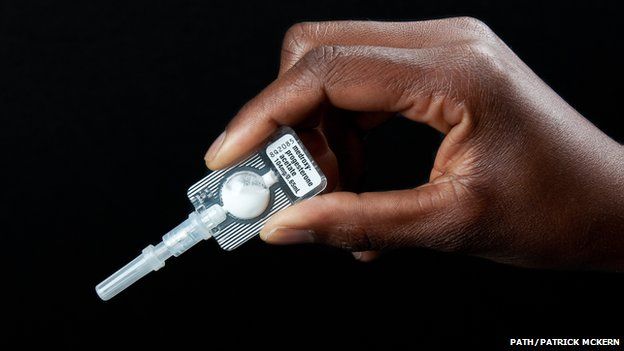Price of 'exciting' self-injectable contraceptive cut
- Published

The price of an innovative device which allows women to give themselves a contraceptive jab has been cut.
Sayana Press has mostly been used by women in developing countries, as part of a global push to expand access to modern contraception.
Working in collaboration with donor organisations has enabled the drug company Pfizer to drop the price from $1 a unit to $0.85 per dose.
The move comes ahead of a big summit on family planning in London this summer.
The summit, which will track progress from a similar event five years ago, will be watched closely because of recent cuts to global aid for family planning by the Trump administration.
Sayana Press dispenses with the need for a conventional needle and syringe - so it has been seen as a significant development for women living in rural parts of Africa.
The long-acting progesterone-based contraceptive, which provides contraceptive cover for three months at a time, is licensed for use by the NHS in the UK - but Pfizer admits that uptake here has been "modest".
The pre-packaged, single-use jab is now thought to have reached more than 1.5m women in countries such as Uganda and Burkina Faso.
A long-term commitment to helping fund this programme - by organisations including the Bill and Melinda Gates Foundation and the Children's Investment Fund Foundation - has helped drive the price down.
'I now feel in charge'
In Uganda, one of four pilot countries, 160,673 doses of Sayana Press were handed out during the past two years.
Dr Dinah Nakiganda-Busiku, from the Uganda Ministry of Health, said: "Women told us that self-injecting gave them more privacy.
"We hope to now make this part of our public procurement plan, so we don't have to rely on donors."
One user from a small village in northern Uganda, a mother-of-two called Ms Fiona, described how previously she had had to take a long motorcycle trip to reach a clinic.
She said: "Last July, one of the health workers told me I could inject myself - and she trained me.
"I now feel more in charge of my life and my future as a mother."
'Uncertainty' about US position on family planning
The London summit five years ago agreed an ambitious goal to enable 120m more women around the world to access contraceptives.
Chris Elias, president of global development for the Bill and Melinda Gates Foundation, said: "The London summit will be an important follow-up event where we can look carefully at the significant progress that's been made.
"There is currently a lot of uncertainty about the US position. But we hope to continue what has been a long-standing collaboration.
"But there is a long history of bipartisan support for development aid - and particularly in supporting the health of women and children.
"Our foundation looks forward to working with the new administration."
- Published24 September 2015
- Published16 November 2014